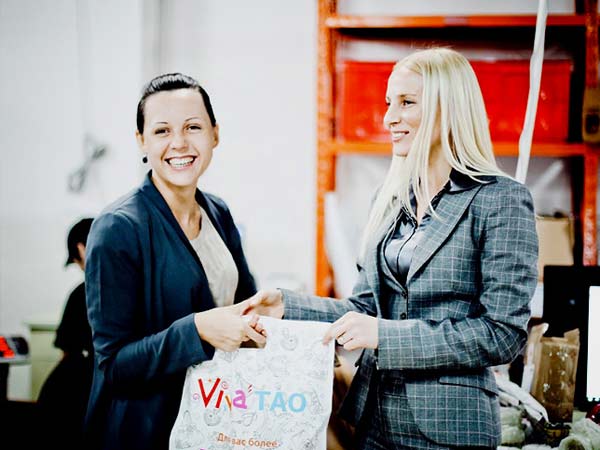
|
 |
|
Anastasia Kovaleva (right) greets a Vivatao customer at the company's store in Kaliningrad, Russia.Provided to China Daily |
When Anastasia Kovaleva was growing up in Blagoveschensk, Russia, she could almost see China from her front door.
"It's right across the border from Heihe, in Heilongjiang province," she said. "They are only divided by a river."
In fact, the two cities have formed an informal trading zone, and citizens can pass freely from one to the other for up to 30 days without a visa.
"Many schools offer Chinese studies in my hometown," she said. Thanks to that proximity, and her degree in international economics, Kovaleva said she knew that China would be part of her future career.
But while studying advanced-level Mandarin at Beijing Language and Culture University, she saw many expats seizing opportunities to be entrepreneurs. She was excited about the prospect of working for herself, instead of a company.
At that time, she was also buying things for friends back home on Taobao, China's largest online shopping network. Before long she was placing orders for friends of friends of friends, and she suddenly realized she had a business in her hands.
She enlisted a Russian partner back home, and Vivatao was born. The website is a virtual mirror of Taobao, but in the Russian language.
"You can buy anything that's on Taobao," she said.
Five years later, Vivatao is a huge customer for Taobao. Kovaleva has 30 employees and a 20,000-square-meter warehouse in Beijing. Business tends to have seasonal cycles — the peak month came earlier this year, when shoppers for the Russian New Year holiday generated orders totaling 10 metric tons of merchandise.
If that sounds like a lot, it's all the more manageable than it was when Kovaleva was shuttling packages in and out of her apartment for friends back home.
"The warehouse is fully automated, a system we bought from a German IT company, so bar codes on orders match bar codes on our shelves. We have a coded bin for every customer," she said, noting that more than 60 percent of orders come from repeat customers.
Vivatao isn't the only online outfit that creates a translation portal into Taobao, but the company has built its success on service.
"We provide quality control by checking every order in our warehouse," she said. Her team makes sure the order is correct and in the case of clothing is the right size. If the quality is not as good as advertised, the inspector contacts the customer in Russia to see if it's acceptable, since returns and refunds are limited to seven days.
"Sizes are the biggest problem. When a Russian sees ‘XL' they expect something very big," she said, opening her arms wide. "In China, XL is usually not so big." There are guidelines on the site so that people can follow waist and chest measurements, for example, instead of guessing what "medium" means.
Out-of-stock items are a challenge, too, since her company has collected payment for the order already. "At that point, we contact the customer, ideally by online chat, and have a conversation in Russian to determine if there is a good substitute offered online."
Her partner, Alex Netrusov, meanwhile, operates a bricks-and-mortar Vivatao store in Kaliningrad, in western Russia, with four employees. Customers can walk in and place orders, and also examine certain kinds of merchandise, such as bicycles, before committing to a purchase.
"It's about image and also about overcoming fears of the Internet," she said. "We advertise a lot in Kaliningrad, on billboards and TV, and in supermarkets, and so people see that our company is real. The website also features the store in Russia and the warehouse in Beijing, so customers can be sure they are not sending money to a phantom enterprise."
Until now the company has focused on customers in Russia, but the next step is to take the business worldwide.
michaelpeters@chinadaily.com.cn







